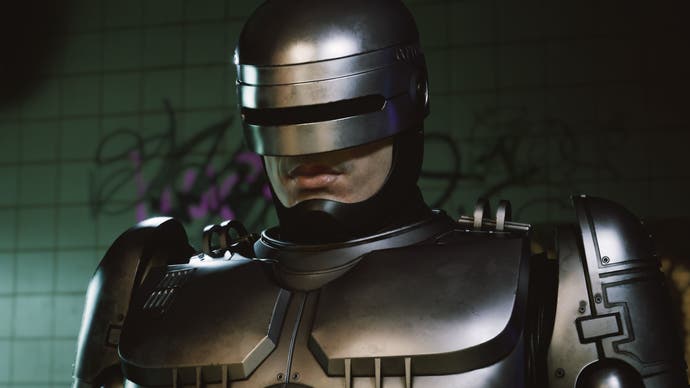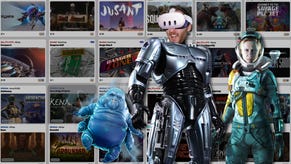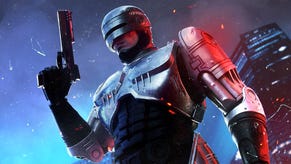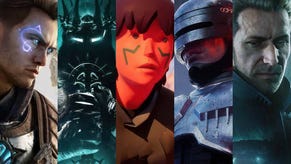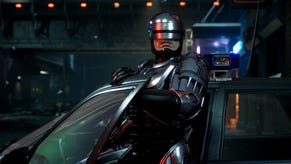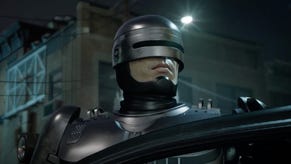RoboCop: Rogue City review - double-A throwback too faithful for its own good
Three out of five? You¡¯re coming with me.
RoboCop: Rogue City would have been the absolute biz back in 2005. This might sound like a criticism, and to a certain extent it is. But I mean it equally as a compliment to developer Teyon's work. The studio's latest licensed FPS following Terminator: Resistance is a fine example of a AA game, with an ambition that exceeds its budget, and a sincerity that helps power through no small amount of wonk. It's a decent shooter, a surprisingly involved policing game, and an authentic RoboCop experience. But as with all Teyon's games it lacks refinement, while it adheres too closely to the themes and plot points of the films to truly flourish as its own tale.
Taking place between RoboCops 2 and 3, Rogue City kicks off with a glorious statement of intent. A gang of crazed punks named the Torch Heads takes over Detroit's TV station, to send a very public message to a new and mysterious crime lord in town, creatively referred to as "The New Guy in Town". The message is straightforward enough: "We're here, we want to work with you, and we mean business". To prove it, they take a bunch of hostages.
And so in you stomp, as RoboCop, to put an end to this special broadcast. Armed with his Auto-9 pistol, you carve through an army of Keith Flint wannabes in gleefully excessive style. As your machine-pistol rakes across neat and tidy news offices, the air becomes filled with sparks and paper and crumbling concrete. When shots land where they should, enemies fly back in in a shower of unctuous red squibs, limbs shredded, heads squelching like a pineapple in a printing press. The environment is a weapon too, letting you grab objects like chairs and computer monitors to toss at criminal creeps, or wrap your metal fingers around their necks, tossing them out of windows or at other foes to knock them down. I became particularly fond of throwing them up into the ceiling, not least because there was always a one-in-five chance they might glitch through it, their ragdoll legs dangling through the world geometry.
If you're here for RoboCop as morally dubious power fantasy, then the opening half-hour delivers that in buckets. Maybe you'll rescue the hostages when you breach the doors of the newsroom, maybe they'll be brutally gunned down before you can nail their captors in time. One way or the other, you'll put those Torch Heads out for good, and feel damned satisfied while doing so.
I'll discuss the broader returns of the combat later. For now, it's back to Detroit PD for a debrief, where Rogue City starts making the case that it's more than just a shooter. You can explore the PD freely, performing little side-missions for your fellow cops, and engaging in Mass Effect-style dialogue sequences with characters like psychologist Dr Blanche, who Detroit PD's owner OCP has hired to investigate glitches RoboCop is experiencing. Through this, Rogue City strives to explore the film's themes of personal identity, letting you choose to embrace or reject Robocop's humanity. The execution of this is clunky to say the least, but it does influence how other characters in the game perceive and react to you, which is interesting.
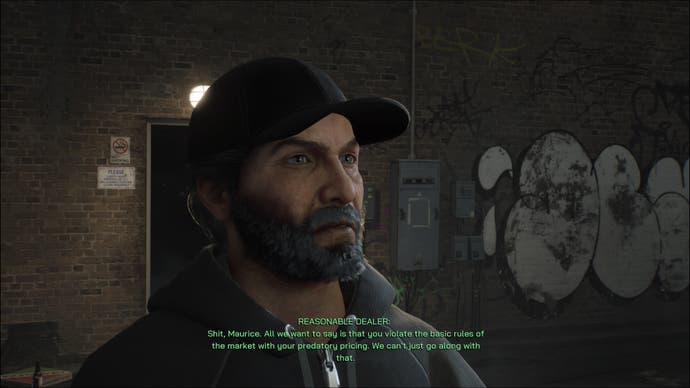
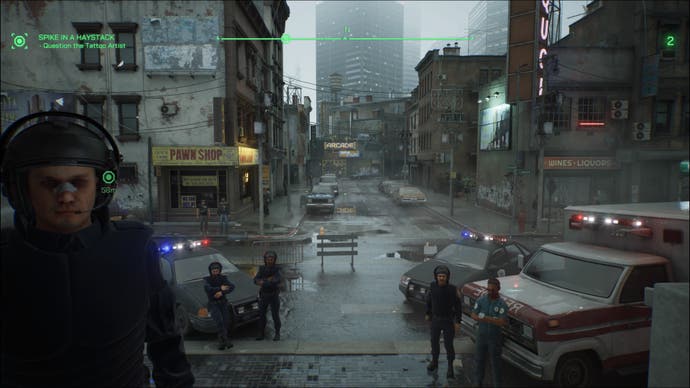
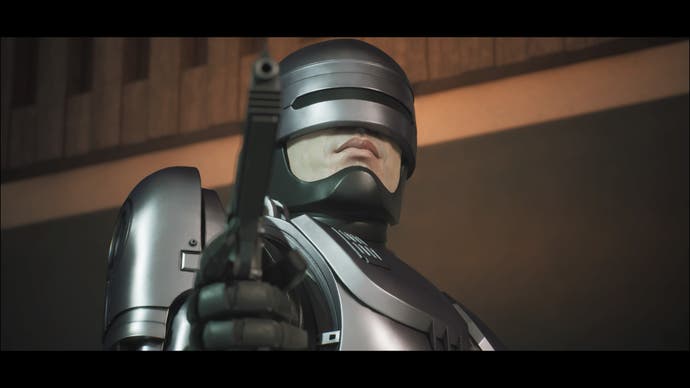
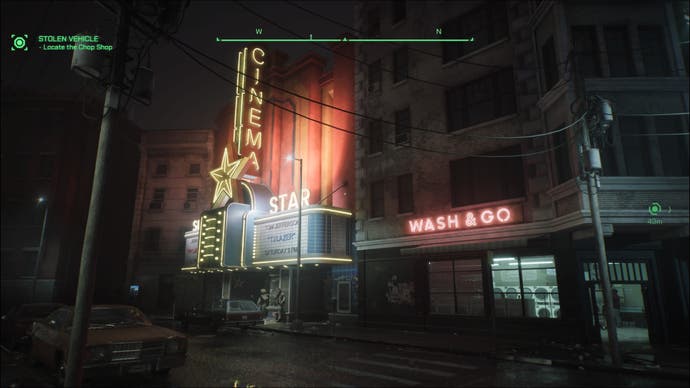
The bigger surprise arrives when you leave Detroit PD and head Downtown. This much larger area lets you explore several streets of rundown Old Detroit, all glistening asphalt, soot-stained brick tenements, and trash-strewn back-alleys. Here, you chase down leads to the New Guy's identity, but you can also enforce the law through numerous side activities, ranging from handing out tickets to illegally parked cars, to more bespoke side-missions that can be fairly elaborate. One of these involves tracking down a drug dealer stealing from other dealers, which Robocop attempts to do by calling him up on a payphone. It takes the dealer all of thirty seconds to figure out he's talking to RoboCop. But then the rival dealer appears at the thief's door and the thief immediately starts begging RoboCop for help.
Downtown Detroit is a great example of the open-world in miniature. It's just big enough to feel like a plausible space, and has just enough stuff in it to lend value to exploration. It also makes decent use of RoboCop's eighties' vision of the future, with missions that take place in a blinking, bleeping arcade and a cramped, colourful VHS store. Many missions also let you choose what kind of RoboCop you want to be, exacting the letter of the law, or putting your faith in the public trust with a more lenient approach.
Outside of Downtown, you'll find more classically-structured FPS missions, exploring an abandoned factory where the Torch Heads' leader is playing an underground rock gig, a twisting steel mill filled with heavily armed bikers, and a gnarly mission where RoboCop gets caught in the middle of a prison riot. None of these are especially radical level design wise, but they're all substantial and well-structured, with meticulously realised locations.
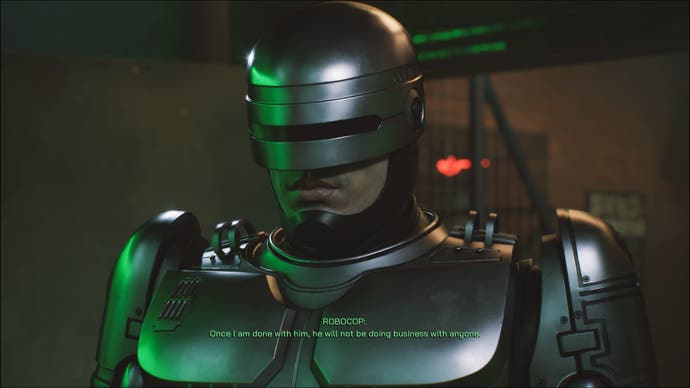
As a shooter, Rogue City succeeds in making you feel like RoboCop. You move slowly and inexorably through locations, relying on RoboCop's armour to absorb the huge amount of gunfire coming your way. Alongside his Auto-9 sidearm, RoboCop can wield the many weapons dropped by enemies, which range from 9mm pistols all the way up to grenade launchers. But the Auto-9 is by far the most fun and effective weapon to use in most situations, not least because you can give it some ridiculously powerful upgrades, like an ammo autofeeder that removes the need to reload. This can make Rogue City a bit of a one-gun shooter, but I never grew tired of using that gun.
One downside to Rogue City's commitment to its portrayal of RoboCop is that there isn't much you can do when an enemy has the upper hand. Some later levels and boss battles pit you against formidable challenges, and the only way to get through these is to peek around corners taking potshots at foes, which doesn't feel very RoboCop. The problem is exacerbated by an uncompromising checkpoint save system that can cost you large chunks of progress, especially in the later game.
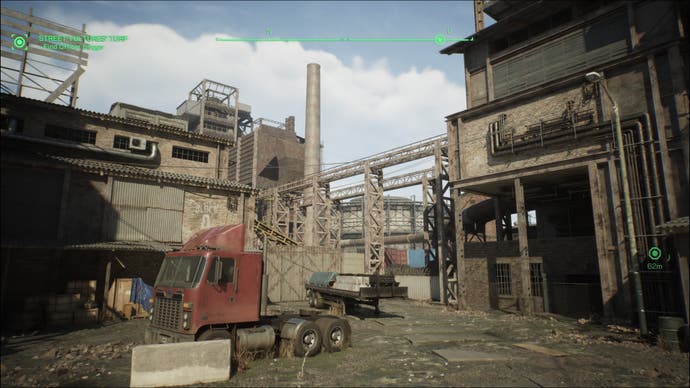
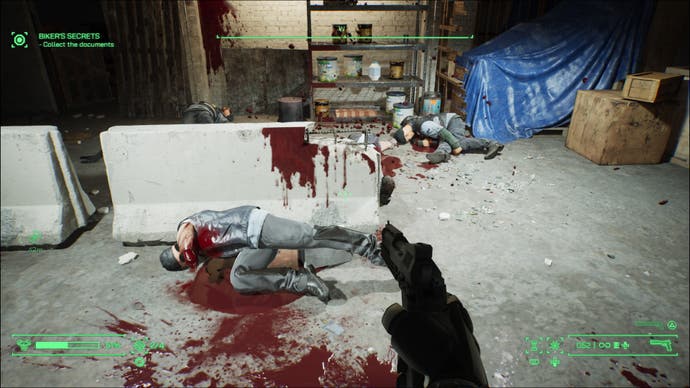
Two other problems Rogue City suffers from. First, there's that lack of refinement. Environments and character models look great, but animations are stiff and unconvincing, especially facial animations, which is a problem in a fiction that has such exaggerated characters. While I love the Downtown area, I was getting tired of it by the third revisit, and the game would benefit from a second hub area to explore in the latter half. The writing and acting generally falls a little flat, although Peter Weller brings it for his vocal performance in the title role. There are some fun one liners in here I won't spoil, but I also love how he clips the vowels of certain words like "Trouble" in a way that makes you go "Oh yeah, that's RoboCop." There are a few technical issues too, like the aforementioned characters glitching through walls, and an unsightly visual hitch that appears whenever the camera switches perspective during dialogue.
Rogue City's biggest problem, though, is that its "new" story isn't all that new. Thematically, the story covers much the same ground as the original film, targeting corporate ownership of public institutions, the sweeping aside of the poor for gentrified districts, the shunting aside of human workers in favour of automated machines, and how greed and destitution leads to increases in crime and violence. All of this is fine, but it also repeats a lot of the plot points from the first two films, like OCP seeking to replace RoboCop with a new model, and Detroit PD threatening to strike over OCP's handling of the department.
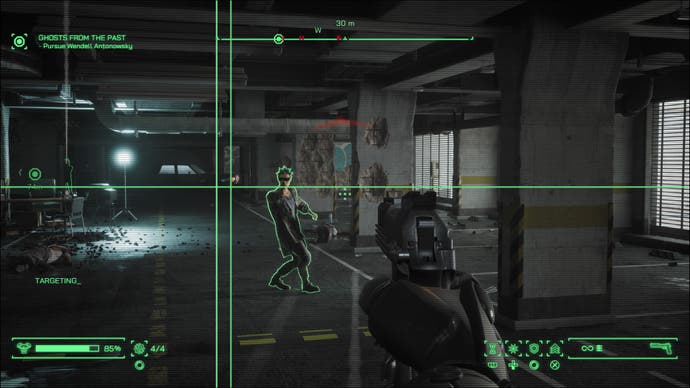
Given how far licensed games have come since Arkham Asylum, Teyon could have been more adventurous. The game's adherence to the structure and ideas of the original films also has some unfortunate ramifications. For example, the portrayal of Detroit PD as honest, hardworking blue-collar workers struggling against budget constraints sits a lot less comfortably in 2023, when we know US police budgets are vastly overinflated compared to other public sectors, and that issues like corruption and racism are endemic within policing in a way that has little to do with corporate ownership.
To be clear, I'm not saying RoboCop should be wandering around Detroit shouting ACAB. Rather, in its strive to mimic the anti-corporate satire of the film, Rogue City misses an opportunity to ask other, more pertinent questions, like how does a cop programmed to follow the letter of the law fit within a policing system that itself often doesn't? Throughout, the game asks whether a robot is fit to do a policeman's job, which only works as a debating topic if your audience accepts the police are doing the job well in the first place, a point that Rogue City glosses over. There's one moment in Rogue City where an experienced officer accuses a rookie of being an OCP spy and threatens to hit him. As RoboCop, you can point out that doing so would be illegal, whereupon the officer accuses you of being in league with OCP because you called him out, because you stepped off the tribal line. These are the kinds of tensions you could build something genuinely new out of, but Rogue City never really interrogates them.
Yet while Rogue City might not do much that's new, it is for the most part a convincing facsimile of the old. And not just as a slice of RoboCop fiction. Alongside being Teyon's best game, Rogue City is a welcome example of a style of game that doesn't get made much anymore. At some point during the 2010s, the upstart AA contender was brutally shot to death by a cackling gang of megabudget prestige titles and worthy indie games. In Rogue City, Teyon has brought it back to life, armed, armoured, and ready for duty.
A copy of RoboCop: Rogue City was provided for review by Nacon.
